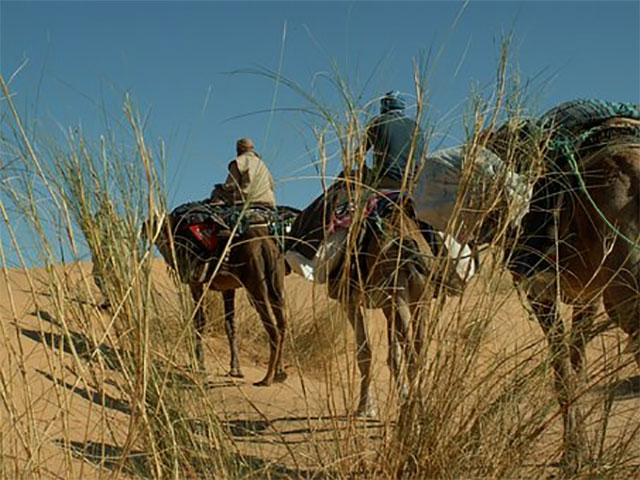
Hello my “Walking with Jesus” friends on this Tuesday,
I wonder if you’ve ever found yourself in what appears to be an unresolvable disagreement, especially one which has escalated to conflict? Today let’s look together at a similar situation in Jacob’s life which has brought indescribable pain into the family. What might God show us about this today, for I’m sure you’d agree these types of irreconcilable differences are far too frequent, doing way too much damage in our world. Join me in Genesis 31 in the Bible.
We’ve been traveling with Jacob and yesterday he fled from where he had been living for more than 20 years. He’d come to that place empty handed and alone. He’d been taken in by his uncle Laban, he married both Laban’s daughters, and he joined his uncle in business. Relationships had become frayed over the years, business dealings almost impossible. It was time for Jacob to leave, and then Jacob had a dream in which God told him to leave immediately and move back to the region where his parents Isaac and Rebekah lived.
Jacob took his entire large family, all their belongings and of course their many flocks of animals, and began their relocation journey of several hundred miles. Because the relationship between Jacob and his father-in-law had deteriorated over the years, Jacob chose to leave while Laban was out in the fields shearing his sheep. When Laban heard Jacob had packed up and left, without any warning or goodbye, Laban quickly left his shearing work, in hot pursuit. It took seven days for him to catch up to Jacob and his large traveling caravan, and by that time Laban had a full head of steam prepared to unload on Jacob.

Genesis 31:26 gives us the record: “Laban said to Jacob, ‘What have you done? You have deceived me, and you’ve carried off my daughters like captives in war. Why didn’t you tell me so I could send you away with joy and singing. You didn’t even let me kiss my grandchildren and my daughters goodbye. You have done a foolish thing. I have the power to harm you but last night the God of your father said to me ‘Be careful not to say anything to Jacob…’ Now you have gone off because you longed to return to your father’s house, but why did you steal my gods?” Oh my, I suppose there may have been much more Laban said that is not recorded, but this gives us enough insight into Laban’s perspective of what was happening here and the volatile emotions everyone had. Have you ever been in a conflict where you and someone else saw a situation entirely differently, even though you both were looking at the very same thing? Did your contrasting perspective lead you into deep, unresolvable conflict? That’s what was happening here.
There are really two issues here… Laban’s accusation that Jacob stole his family ‘gods’, and Laban’s assumption that Jacob had been ungrateful for all Laban had done for him and fled in the night taking his family and belongings, in disrespect of Laban. Of course Jacob’s perspective on WHY he had led his family to leave was entirely different. But first what about this matter of family ‘gods’? Let’s remember Laban was the son of Abraham’s brother Nahor, thus he’s an uncle of Jacob. We presume Laban had grown up with some understanding of the God Abraham and his family worshiped, but it appears Laban may have been very much like Lot who was son of Abraham’s other brother Haran. Lot and Laban both seem to have been enticed into the lifestyle of the idol worshiping people of the cities where they lived. For Lot that was Sodom, for Laban it was Haran. Thus Laban had idols in his home which he and his family worshiped. Earlier in Genesis 31:19, as Jacob and his wives were packing, preparing to leave, the record tells us Jacob was not aware but: “Rachel stole her father’s household gods…”

Was it because Rachel wanted to hurt her father or was it because she had grown up with those idols and felt they might give her a little taste of home and maybe some comfort as she traveled with her husband to a new land where she’d be a stranger? All we know is Jacob was unaware of what Rachel had done, and so Jacob was confident no one in his party had stolen anything of Laban’s, he invited Laban to make a full search. Laban did, but found nothing. Rachel had hidden the idols in her camel saddlebags and she was sitting on them, so Laban didn’t search there. Jacob was angry, and so he unloaded on his father-in-law Laban: “What is my crime? What sin have I committed that you hunt me down? Now that you’ve searched through all my belongings, what have you found that belongs to your household?… I have been with you for 20 years. For 14 years I worked for your two daughters and six years for your flocks and you changed my wages ten times. If the God of my father had not been with me, you surely would have sent me away empty handed…” (Genesis 31:36-42)
It’s not difficult for us to put ourselves in the middle of this fight, is it my friends? Look around… several of Jacob’s young children and his four wives, and several of the servants traveling with Jacob, as well as several of Laban’s servants who came with him, are all witnessing an argument rooted in years of resentment and bitterness between these two men. Accusations are flying, tempers are flaring. The truth is they both are deceitful men, and both have been wounded deeply by the deceitfulness of the other.
Have you noticed my friends that once dishonesty takes root in a life, a relationship, a family, or a business, it grows like a cancer and it produces a wide range of painful, toxic fruit. Fruit like anger, bitterness, resentment, lies, mistrust, no respect, sometimes slander or manipulation, and broken relationships. I think both Laban and Jacob knew their family relationships were a disaster because of many years of THEIR deceitfulness, BOTH of them. NEITHER man seems ready to acknowledge their wrongdoing, apologize or seek any type of reconciliation. Instead, it seems they agreed to part ways and not pursue any type of retaliation against each other. Have you ever been part of something like that my friend? Have you found unresolved bitterness and resentment doesn’t go away, it festers like an open sore.

So Jacob and Laban piled up a big pile of stones at the place of their confrontation, as both a boundary line between them, and a witness to their agreement to separate permanently without any further retaliation or reconciliation. The words spoken there are worth hearing: “This heap of stones is a witness between you and me today. May the LORD keep watch between you and me when we are away from each other…. This heap is also a witness that I will not go past this heap to harm you and you will not go past his heap to harm me. May the God of Abraham be judge between us…” (Gen. 31:48ff)
Look at them my friends… two very successful businessmen, uncle and nephew, father-in-law and son-in-law, united into one large family by the marriage of Laban’s two daughters to Jacob and 20 years of time living and doing business together. But those years were filled with frequent tension, resentment and deceitfulness between them. With both of them nursing wounded hearts, they evidently both felt the only reasonable path forward was permanent separation, hundreds of miles apart. What do you suppose Leah and Rachel felt as they watched their Dad and their Husband argue? And what about the children as they watched their Dad and their Grandfather argue? Can you imagine what might have happened that day if one of these two men had humbled himself and begun the process of reconciliation?

The record says they all had a meal together, Laban spent the night and then “Early the next morning Laban kissed his grandchildren and his daughters and blessed them. Then he left and returned home. Jacob also went on his way…” (Gen. 31:35) As far as I know these two men never saw each other again, nor did Laban ever again see his daughters or grandchildren for the rest of his life.
But may I point out something very interesting? The name of the place where they piled up those stones that day is “Mizpah“, which means ‘watchtower.” Several hundred years later, in that very place, the people of Israel, descendants of Jacob’s family, gathered there for a profound ceremony of repentance. Sin had been widespread, God had withdrawn his hand of blessing from His people who had been living in rebellion against Him. But in 1 Samuel 7 we find the story of Samuel, the prophet of God, inviting the Israelites to gather in worship and repentance at Mizpah. They did, and as they worshipped their enemies the Philistines rallied to attack them, thinking they’d be defenseless as they worshipped. As the attacking warriors approached Samuel and the people cried out to God for His help, and the record says: “…the Philistines drew near to engage Israel in battle. But that day the LORD thundered with loud thunder against the Philistines and threw them into such a panic they were routed… and Samuel took a large stone and set it up between Mizpah and Shen. He named it ‘Ebenezer’ saying, ‘Thus far the LORD has helped us.” So the Philistines were subdued and did not invade Israelite territory again.” (1 Samuel 7)
Now, as you and I reflect on these two powerful events which both took place at Mizpah, what does the Holy Spirit of God say to your heart my friend, about the contrast between hard hearted deceitfulness which breeds conflict, and repentance seeking restoration in relationship, first with God and then with others? Let’s spend a few moments reflecting on all the relationships you and I have both present and past. Is there unresolved conflict still brewing in you and breeding resentment, anger and retaliation? What difference might repentance and God led reconciliation make, rather than ignoring or nursing the conflict? What lessons does God want us to learn from what happened at Mizpah?
Oh my friends, I’ve found a song that may be very helpful to all of us, right here. . .
Today’s Scripture is Genesis 31.
Choose below to read or listen.
Bible images provided with attribution to www.LumoProject.com.
Have a comment or question about today’s chapter? I’m ready to hear from you, contact me here.

Pastor Doug Anderson 262.441.8785
“Let us run with perseverance the race marked out for us, with our eyes fixed on Jesus…” (Heb. 12:1,2)
Archived back issues of “Walking with Jesus” and other resources are available by clicking here to open our ‘home page’ (or go to HOME at upper right of this page).
Share with friends. Subscribe below for daily “Walking with Jesus”.
Facebook
Twitter
LinkedIn
Pinterest
Email
WhatsApp


